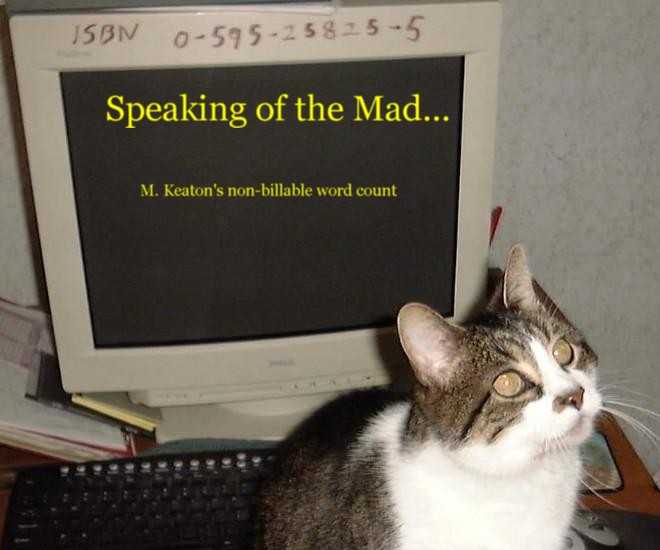In one of the panels at Conclave, the question was asked: now that royalty payments are infeasible, how are writers going to get paid? Are there any new ideas out there? The question didn’t get answered and I thought I’d address it here.
Let me explain a bit of the background to the issue. Traditionally, writers are paid royalties, an amount of money per book sold. This is usually around 4-6% of the cover price so when you buy a seven dollar paperback, the author gets an amount around 35 cents. (Numbers vary depending on binding and other factors.) Needless to say, you have to sell a lot of books to make money. (Typically, the author is paid an up-front “advance against royalties” and then starts getting royalty payments after the advance is “earned out”. The average advance is somewhere around five thousand dollars per book and most authors don’t earn out. As a rule of thumb, if you assume that your local author is getting five to seven grand a book total, you’ve got a pretty good view of the writing economy. Don’t quit your day job.)
The problem with the royalty model in an internet based economy (and the reason that most writers expect that something will have to change) is the e-book. E-books are cheap and getting cheaper. I could go off on a rant about how the real problem is that the market doesn’t see the creative effort of writing a book as having monetary value and therefore thinks the only real costs are in paper but that’s not the point. The point is, if an author can’t make a decent living on 5% of seven bucks, then 5% of two bucks isn’t worth the effort to write the book. (Think of it: one morning someone invents an internet application and suddenly you take an almost 80% pay cut.) So something’s got to change in the way authors get paid, but what?
The answer is: nobody knows. In the near-term, it’s going to get worse before it gets better. There will be a lot of different things tried, some better than others, and a lot of places will stick with the royalty model as long as possible.
But the question was asked if there are any other feasible alternatives that anyone has considered and I believe there is one—one that has the advantage of having been used successfully before.
Patronage.
Before dismissing the idea as crazy, hear me out. Patronage has a fine history in the arts. After all, Dante didn’t write the Inferno on spec. Nobles patronized artists, artists provided books, music, paintings, sculptures, and so on to please their patrons and life went on. I know some people will yell that patronized art is corrupted and not true to the artists visions but, frankly, these people don’t know very much about the market or history. In actuality, patronage provides for a wider range of expression because, instead of having to cater to a marketing demographic or federal grant program, the artist only has to please one person—their patron—and individuals have much broader tastes and tolerances than homogenized cultures.
But are there enough rich people willing to patronize and make the idea work? Let’s go back to history. Why did the nobility and the church patronize artists to begin with? Some were altruistic but most were after two simple things: propaganda and public image. Either art to support and promote a specific agenda or art so that the common man would say “Well, that baron supports this theater and that writer and these paintings and even though I ain’t happy with the taxes, at least he ain’t such a bad feller all the way around. Let’s put off the revolt until next week.”
Now go watch TV for a few minutes and look at the ads. Notice that a lot of them aren’t for products or services; they’re general touchy-feely our company isn’t evil, we’re your friend kind of ads. In other words, public image ads. That tells you that the market and the money are there. You have a clear potential, no only for individual patronage, but also patronage by charitable organizations, foundations, schools, research institutes, and the entire scope of corporate America.
Let’s make it even more fun. Let’s say that a corporation decides to sponsor an author and that they make a portion of that author’s writing (and maybe that author’s time) available for free to schools and libraries. Think about it. On every bookshelf, from bookstores to supermarkets, the sponsor’s corporate logo has replaced the publisher’s imprint (massive brand exposure) plus now it’s going into schools and libraries too. Why wouldn’t a corporation spring for that? You could buy a dozen authors for the price of a Super Bowl ad.
And what about stocks? What if you could buy a percentage of your favorite author? If a group of you could go together, buy stock in an author, and jointly support his or her work? Especially is the author threw in some nice bonuses like signed first edition copies for all stock holders, exclusive beta reads and deleted scenes, character cameos of preferred holders, etc.? We could end up with a much broader market selection that we have now where only two major publishers rule most of the field.
I’m not saying it’s going to happen and I’m not saying whether it would be good or bad for society but I am saying that it is a plausible, feasible alternative.
Subscribe to:
Post Comments (Atom)





















No comments:
Post a Comment